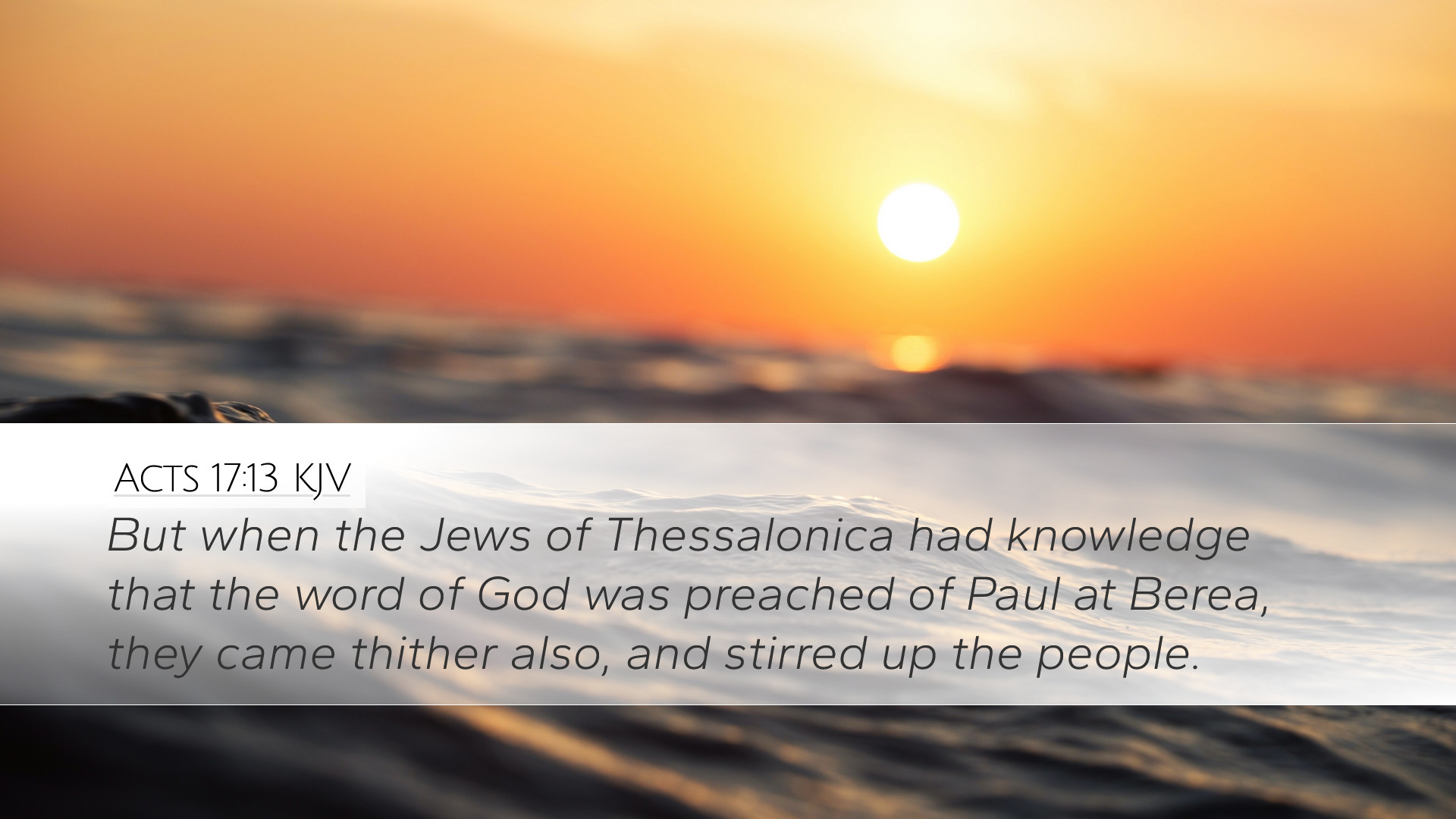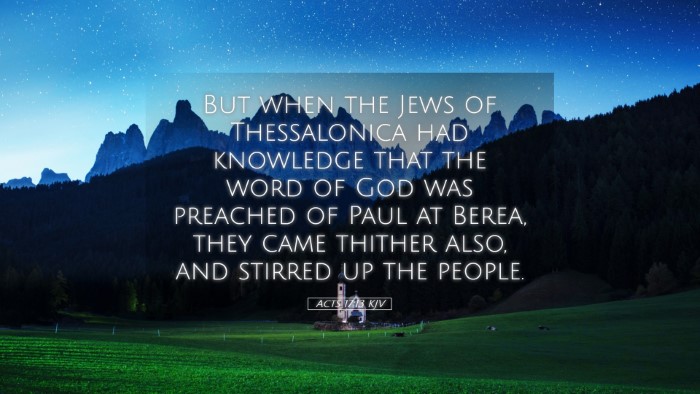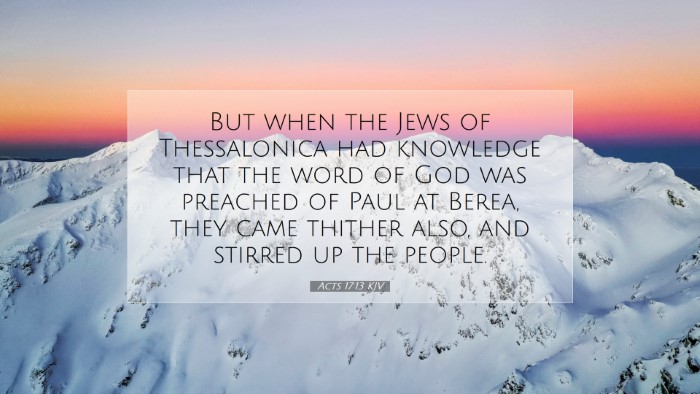Commentary on Acts 17:13
Bible Verse: "But when the Jews of Thessalonica had knowledge that the word of God was preached of Paul at Berea, they came thither also, and stirred up the people." (Acts 17:13)
Introduction
This passage occurs during the apostolic mission of Paul, illustrating the relentless opposition faced by the early Christians. Acts 17:13 highlights the Jews of Thessalonica reacting to the spread of the gospel in Berea, showcasing their determination to counteract Paul's influence. The narrative serves as a powerful reminder of the spiritual battles inherent in the advancement of the Gospel and the varied responses it elicits.
Context and Setting
The context of this passage is paramount. Paul and Silas had only recently escaped from persecution in Thessalonica, where they had effectively preached the gospel. Their journey to Berea was not merely a geographical movement but a strategic one, seeking a place where they might continue their evangelistic efforts without immediate threat. However, the return of the Thessalonian Jews signifies a persistent menace against the missionary work:
- Geographical Significance: Berea was located approximately 50 miles southwest of Thessalonica, indicating the reach of opposition even into neighboring regions.
- Paul's Missionary Approach: The apostle is characterized not only by commitment but also by a consistent urgency in proclaiming God's Word, underscoring the imperative of evangelism regardless of opposition.
- The Role of Jewish Opposition: The passage reflects the significant role the Jewish community played in the early rejection of Christianity, a complexity that is crucial for understanding the dynamics of the early church.
Exegesis of Acts 17:13
In analyzing this verse, we see several key components relevant to both historical and theological discussions:
- Knowledge of Preaching: The phrase "had knowledge that the word of God was preached" reflects an active awareness of the gospel's progression. Their subsequent actions indicate a concerted effort to suppress the message, illustrating the conflict between established religious authority and the new movement of faith.
- Arrival at Berea: This suggests that the apostles' previous successes were seen not merely as local triumphs but as threats to the broader social-religious order in the region.
- Stirred Up the People: The contention initiated by the Thessalonian Jews points to the human element in spiritual warfare, where community influence would sway popular opinion, signifying the challenge faced by the early church in gaining acceptance.
Theological Implications
Acts 17:13 offers rich theological reflections for pastors and scholars:
- Persistence of Opposition: The opposition faced by Paul quickly becomes a motif throughout Acts, revealing that the advance of the Gospel often invites resistance, which is a common theme in various Biblical narratives.
- The Nature of Evangelism: Evangelism is inherently confrontational, challenging existing belief systems and often leading to conflict. This passage exemplifies the necessity for believers to remain steadfast in their mission despite adversities.
- Response of the Early Church: The early Christians' responses can inform modern practices of evangelism; they relied heavily on prayer, community support, and the guidance of the Holy Spirit in preparing for and enduring persecution.
Insights from Public Domain Commentaries
Matthew Henry's Perspective
Matthew Henry emphasizes the fervor with which the Thessalonian Jews pursued Paul and Silas. He notes that their actions embody a mixture of jealousy and animosity. These emotions often spike in those who feel threatened by new teachings which challenge their long-held beliefs. Henry's elucidation encourages an examination of personal jealousy and how opposition can sometimes arise from within one's community:
- Jealousy Over Truth: Henry posits that the Jews were alarmed by the success of the Gospel, which incited their desperate measures to undermine it. Their intrusion into Berea was not merely a territorial claim but a desperate reaction to the transformative nature of Paul’s preaching.
- Lessons in Adversity: He draws attention to how Paul's continue to preach despite resistance showcases an admirable strength of character, a trait that modern believers can aspire to.
Albert Barnes on the Text
Albert Barnes provides a systematic examination of the socio-religious context surrounding Acts 17:13. Barnes reflects on the jealousy of the Thessalonian Jews as indicative of a broader resistance to change within religious structures:
- Pervasiveness of Resistance: He affirms the notion that the Gospel's advancement often incites strong opposition precisely because it represents radical change. This conflict encapsulates the struggles between ancient Jewish beliefs and the burgeoning Christian doctrine.
- Impact of Evangelists: Barnes concludes by emphasizing the responsibility of evangelists, acknowledging that their messages can provoke intense reactions both positive and negative.
Adam Clarke's Analysis
Adam Clarke brings a detailed historical and literary analysis to the verse. He notes the tactical approach of the Thessalonian opposition, portraying them as determined foes who would stop at nothing to maintain their authority:
- Strategic Persecution: Clarke elaborates on how organized efforts were made to undermine Paul’s ministry, symbolizing the lengths individuals might go to protect traditional religious practices against new interpretations.
- Endurance of Paul: He highlights Paul's perseverance as a model of spiritual resilience—essential for any evangelistic effort faced with adversity.
Practical Applications
For modern Christians, Acts 17:13 conveys numerous practical lessons:
- Awareness of Restlessness: Understanding the restlessness of those who oppose the Gospel can help believers respond with grace and wisdom.
- Commitment to the Mission: The steadfast commitment demonstrated by Paul serves as a challenge to contemporary followers of Christ to maintain focus on their mission regardless of the opposition encountered.
- Community Building: The importance of creating a supportive community to help withstand the storms of persecution is vital for spiritual growth and resilience.
Conclusion
Acts 17:13 is more than a historical account; it presents a vivid tapestry of faith amidst opposition. The story of the Thessalonian Jews' pursuit of Paul illustrates a broader narrative central to the understanding of Christian evangelism. By drawing insights from esteemed commentators such as Matthew Henry, Albert Barnes, and Adam Clarke, modern pastors and theologians can glean profound lessons on perseverance, the nature of opposition, and the enduring impact of the Gospel narrative.


